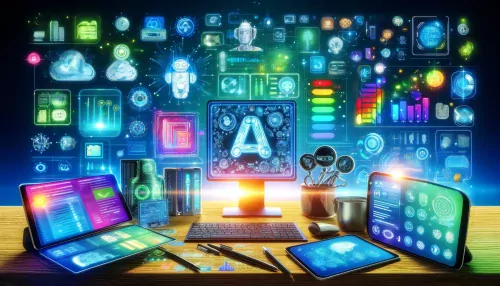
In recent years, artificial intelligence (AI) has emerged as a transformative force in various industries, and content creation is no exception. From streamlining the writing process to generating high-quality, engaging content, AI tools are revolutionizing the way content is produced and consumed. This article delves into the role of generative AI in content creation, exploring its capabilities, benefits, and the potential future impact on the digital landscape.
The Rise of AI in Content Creation
The integration of AI into content creation processes has been driven by the need for efficiency and scalability. Traditional content creation methods often require significant time and effort, which can be a constraint for businesses aiming to maintain a consistent and high-quality online presence. AI text generators and other AI-powered tools have stepped in to bridge this gap, offering innovative solutions that enhance productivity and creativity.
Generative AI refers to a subset of AI that can produce text, images, and other forms of content by learning patterns from existing data. These AI systems, such as GPT-4, are capable of generating human-like text, making them invaluable tools for writers, marketers, and content creators. The ability to produce coherent and contextually relevant content on demand has made generative AI a game-changer in the industry.
How AI Text Generators Work
At the heart of AI-driven content creation are AI text generators. These tools leverage advanced algorithms and machine learning techniques to analyze vast amounts of data and generate text that mimics human writing. The process involves training the AI model on a diverse dataset, which helps it understand language nuances, context, and structure.
One of the key advantages of AI text generators is their ability to produce content quickly and efficiently. For instance, a content creator can input a few keywords or a brief outline, and the AI tool can generate a full article, blog post, or social media update in a matter of seconds. This not only saves time but also ensures that content is consistently produced, which is crucial for maintaining audience engagement.
Benefits of AI for Content Creation
The adoption of AI for content creation offers numerous benefits, including:
- Time Efficiency: AI tools can generate content at a much faster rate than human writers. This allows businesses to keep up with the demand for fresh and relevant content, particularly in fast-paced industries.
- Cost-Effectiveness: By automating content creation tasks, businesses can reduce the costs associated with hiring and training writers. This is especially beneficial for startups and small businesses with limited budgets.
- Consistency: AI tools ensure that content maintains a consistent tone, style, and quality. This is important for brand identity and audience retention.
- Scalability: AI-powered content creation enables businesses to scale their content production efforts without compromising quality. This is essential for companies looking to expand their online presence and reach a broader audience.
- Enhanced Creativity: Contrary to the belief that AI stifles creativity, these tools can actually enhance it. By handling repetitive and mundane tasks, AI allows writers and content creators to focus on more strategic and creative aspects of their work.
Applications of AI in Content Creation
The applications of generative AI in content creation are vast and varied. Some of the most common uses include:
- Blog Posts and Articles: AI text generators can produce well-researched and engaging blog posts and articles on a wide range of topics. This is particularly useful for content marketing and SEO efforts.
- Social Media Content: AI tools can create catchy and relevant social media updates, helping businesses maintain an active and engaging online presence.
- Email Marketing: Personalized email campaigns can be crafted using AI, ensuring that messages resonate with the target audience and drive conversions.
- Product Descriptions: E-commerce businesses can leverage AI to generate compelling product descriptions that highlight key features and benefits, enhancing the shopping experience for customers.
- Creative Writing: AI is also making strides in the field of creative writing, assisting authors in developing plot ideas, character dialogues, and even entire novels.
Challenges and Ethical Considerations
Despite the numerous benefits, the use of AI for content creation also presents challenges and ethical considerations. One of the primary concerns is the potential for AI-generated content to be used for malicious purposes, such as spreading misinformation or creating deepfakes. Ensuring the ethical use of AI tools requires robust guidelines and regulations to prevent misuse.
Another challenge is the potential displacement of human writers. While AI can handle repetitive tasks, it lacks the emotional depth and creative intuition that human writers bring to the table. Striking a balance between AI and human creativity is crucial for the sustainable integration of AI in content creation.








